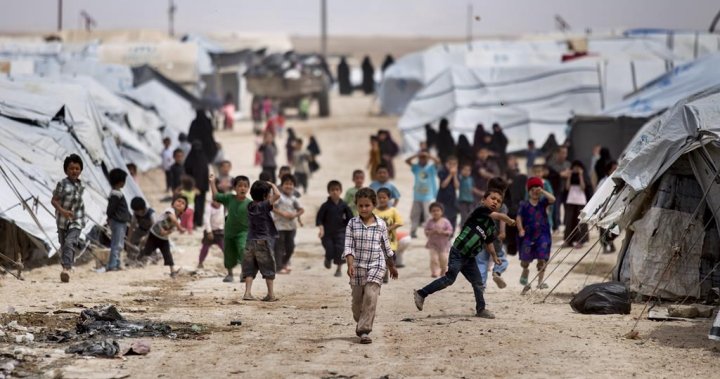The last Canadian woman trying to return home from a detention camp in Syria for captured ISIS members is a national security risk because police lack evidence to arrest her, according to internal documents.
A Public Safety Canada memo obtained by Global News said the RCMP was unable to either charge the Montreal woman, referred to only by the initials F.J., or restrict her movements with a peace bond.
“In the absence of a charge package or peace bond, F.J. would have freedom of movement upon return to Canada,” said the memo, which bore the heading “National Security Threat.”
The “secret” memo to the minister explains why the government decided against returning the mother of six to Canada along with the other ISIS women brought back from Syria in 2022 and 2023.
F.J. has since left the detention facility in Syria on her own, and her whereabouts are unknown, her lawyer Lawrence Greenspon said on Tuesday.
“She’s out of the camp, that’s all I can say.”
Her kids remain at the detention facility for ISIS families, he said.
Global Affairs Canada did not respond to questions.
Toronto woman who married an ISIS fighter and returned to Canada April 6 without being arrested.
Stewart Bell/Global News
Greenspon was previously unaware of the memos but said they showed the government was refusing to assist F.J. because she would not face any legal proceedings such as terrorism charges upon returning to Canada.
Nor do police have enough for a peace bond, which would impose restrictions on her in the name of public safety but do not amount to a criminal trial or sentence. As a result, she would be free once back in Montreal.
While the government viewed that as a national security issue, Greenspon said it was a “circular argument” to deny a Canadian help because police lack evidence to arrest her.
The government had previously said only that it did not have the ability to protect Canadians from the threat she posed, but the memos reveal that is because the RCMP assessment found nothing untoward.
Breaking news from Canada and around the world
sent to your email, as it happens.
“It’s not that they don’t have the means to control her behaviour; it’s that they don’t have the evidence,” Greenspon said. “It tells you something about their assessments.”
The memos also reveal that up to 11 Canadian men are still being held by U.S.-backed Kurdish fighters in northeast Syria. Global News has identified only four who remain in custody.
Ten Canadian children whose mothers are foreign citizens are also detained. While the government is looking into bringing the minors to Canada, it does not intend to aide the non-Canadian mothers.

During the war in Syria and Iraq, dozens of Canadian extremists left to join ISIS. While many were killed in the conflict, some were taken prisoner by Kurdish forces when they defeated ISIS in 2019.
The detainees were held at makeshift prisons and crowded tent camps in a region of northeast Syria that is controlled by a Kurdish guerrilla faction known as the Syrian Democratic Forces.
The Canadian government has now returned all the women except F.J. to B.C., Alberta, Ontario and Quebec. Two of the nine were charged with terrorism, Oumaima Chouay and Ammara Amjad.
The Public Prosecution Service of Canada said Tuesday that hearings were scheduled to begin in the coming months to decide if peace bonds would be imposed on three Edmonton women, Helena Carson, Dina Kalouti and Aimee Vasconez.
In Ontario, Dure Ahmed is subject to a peace bond that remains in effect. Also under a peace bond is Kimberly Polman of B.C. The RCMP has alleged that Polman was part of an all-female ISIS fighting unit. A peace bond for a sixth woman has expired.
Photo released by the administration that controls the Kurdish-majority northeast region of Syria shows a visit by a Canadian delegation, left, before the handover of five Canadian detainees.
AANES
Although Ottawa offered to bring back F.J.’s children, it said she did not qualify for assistance under the government’s policy on ISIS detainees. Threat assessments found she held “extremist ideological beliefs.”
She appealed the decision to the Federal Court, but the case was withdrawn by her lawyer two weeks ago on the grounds she “is no longer in the detention camp,” according to court records.
Memos to the public safety minister disclosed during the court case show an RCMP threat assessment found that F.J.’s “motivation to return to Canada is likely to secure a better quality of life and future for her children.”
“Despite the information above, the RCMP does not have sufficient evidence at this time to support section 83 Criminal Code (terrorism) charges or a section 810.011 peace bond,” the memo said.
A letter from a United Nations Human Rights Commission special rapporteur, also filed in the case, described F.J. and her kids as an “extremely traumatized family in very poor health.”
It said F.J. suffered from shrapnel wounds, anemia, anxiety and depression and had experienced “multiple imprisonments and torture.” Two of her children were born in the war zone, and a third in the detention camp, it said.

The Canadian Security Intelligence Service has warned about the long-term threat posed by what it called CETs, or Canadian Extremist Travellers.
“Although CET returnees may not immediately or directly engage in extremist violence, they still pose a national security risk,” the report said.
“In time, CETs may engage in extremist activities such as fundraising, maintenance of domestic and international networks, radicalization and/or recruitment.”
ISIS has been mostly routed in Syria and Iraq, but remains active and recently claimed responsibility for an attack in Moscow that killed 145 people at a crowded concert hall.
Stewart.Bell@globalnews.ca
© 2024 Global News, a division of Corus Entertainment Inc.




